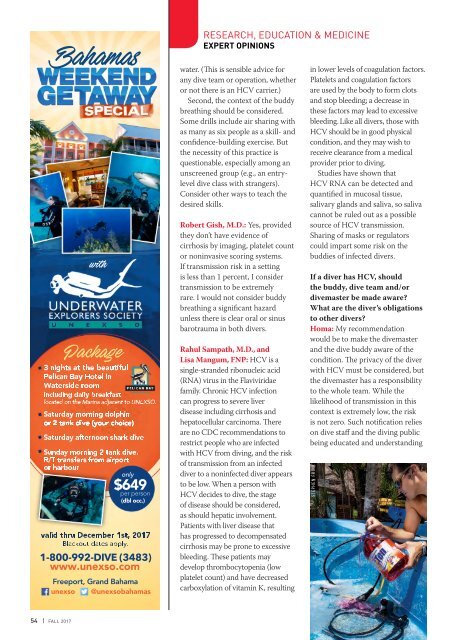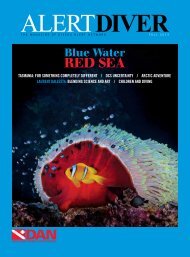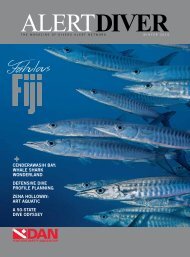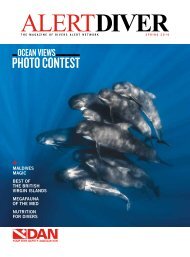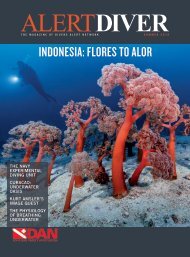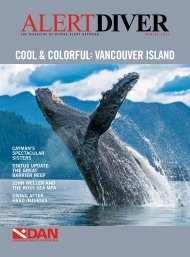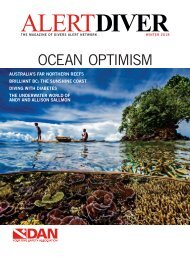AD 2017 Q4
Alert Diver is the dive industry’s leading publication. Featuring DAN’s core content of dive safety, research, education and medical information, each issue is a must-read reference, archived and shared by passionate scuba enthusiasts. In addition, Alert Diver showcases fascinating dive destinations and marine environmental topics through images from the world’s greatest underwater photographers and stories from the most experienced and eloquent dive journalists in the business.
Alert Diver is the dive industry’s leading publication. Featuring DAN’s core content of dive safety, research, education and medical information, each issue is a must-read reference, archived and shared by passionate scuba enthusiasts. In addition, Alert Diver showcases fascinating dive destinations and marine environmental topics through images from the world’s greatest underwater photographers and stories from the most experienced and eloquent dive journalists in the business.
Create successful ePaper yourself
Turn your PDF publications into a flip-book with our unique Google optimized e-Paper software.
Bahamas<br />
with<br />
Package<br />
3 nights at the beautiful<br />
Pelican Bay Hotel in<br />
Waterside room<br />
including daily breakfast<br />
located on the Marina adjacent to UNEXSO.<br />
Saturday morning dolphin<br />
or 2 tank dive (your choice)<br />
Saturday afternoon shark dive<br />
Sunday morning 2 tank dive.<br />
R/T transfers from airport<br />
or harbour<br />
only<br />
$649<br />
per person<br />
(dbl occ.)<br />
valid thru December 1st, <strong>2017</strong><br />
Blackout dates apply.<br />
1-800-992-DIVE (3483)<br />
www.unexso.com<br />
Freeport, Grand Bahama<br />
unexso @unexsobahamas<br />
RESEARCH, EDUCATION & MEDICINE<br />
EXPERT OPINIONS<br />
water. (This is sensible advice for<br />
any dive team or operation, whether<br />
or not there is an HCV carrier.)<br />
Second, the context of the buddy<br />
breathing should be considered.<br />
Some drills include air sharing with<br />
as many as six people as a skill- and<br />
confidence-building exercise. But<br />
the necessity of this practice is<br />
questionable, especially among an<br />
unscreened group (e.g., an entrylevel<br />
dive class with strangers).<br />
Consider other ways to teach the<br />
desired skills.<br />
Robert Gish, M.D.: Yes, provided<br />
they don’t have evidence of<br />
cirrhosis by imaging, platelet count<br />
or noninvasive scoring systems.<br />
If transmission risk in a setting<br />
is less than 1 percent, I consider<br />
transmission to be extremely<br />
rare. I would not consider buddy<br />
breathing a significant hazard<br />
unless there is clear oral or sinus<br />
barotrauma in both divers.<br />
Rahul Sampath, M.D., and<br />
Lisa Mangum, FNP: HCV is a<br />
single-stranded ribonucleic acid<br />
(RNA) virus in the Flaviviridae<br />
family. Chronic HCV infection<br />
can progress to severe liver<br />
disease including cirrhosis and<br />
hepatocellular carcinoma. There<br />
are no CDC recommendations to<br />
restrict people who are infected<br />
with HCV from diving, and the risk<br />
of transmission from an infected<br />
diver to a noninfected diver appears<br />
to be low. When a person with<br />
HCV decides to dive, the stage<br />
of disease should be considered,<br />
as should hepatic involvement.<br />
Patients with liver disease that<br />
has progressed to decompensated<br />
cirrhosis may be prone to excessive<br />
bleeding. These patients may<br />
develop thrombocytopenia (low<br />
platelet count) and have decreased<br />
carboxylation of vitamin K, resulting<br />
in lower levels of coagulation factors.<br />
Platelets and coagulation factors<br />
are used by the body to form clots<br />
and stop bleeding; a decrease in<br />
these factors may lead to excessive<br />
bleeding. Like all divers, those with<br />
HCV should be in good physical<br />
condition, and they may wish to<br />
receive clearance from a medical<br />
provider prior to diving.<br />
Studies have shown that<br />
HCV RNA can be detected and<br />
quantified in mucosal tissue,<br />
salivary glands and saliva, so saliva<br />
cannot be ruled out as a possible<br />
source of HCV transmission.<br />
Sharing of masks or regulators<br />
could impart some risk on the<br />
buddies of infected divers.<br />
If a diver has HCV, should<br />
the buddy, dive team and/or<br />
divemaster be made aware?<br />
What are the diver’s obligations<br />
to other divers?<br />
Homa: My recommendation<br />
would be to make the divemaster<br />
and the dive buddy aware of the<br />
condition. The privacy of the diver<br />
with HCV must be considered, but<br />
the divemaster has a responsibility<br />
to the whole team. While the<br />
likelihood of transmission in this<br />
context is extremely low, the risk<br />
is not zero. Such notification relies<br />
on dive staff and the diving public<br />
being educated and understanding<br />
STEPHEN FRINK<br />
54 | FALL <strong>2017</strong>


